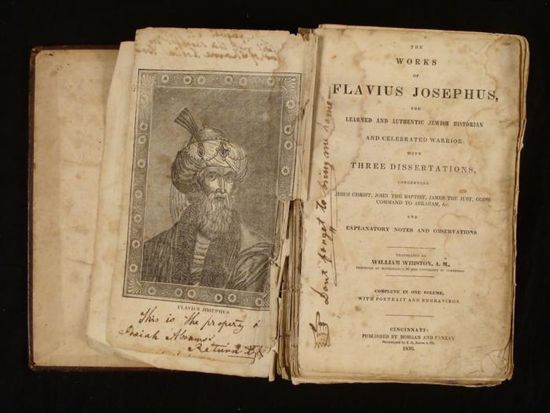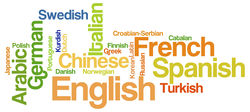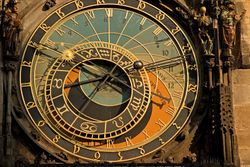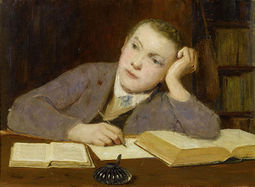Category:Josephus Studies
|
Josephus Studies (Home Page)
Editions of the Works of Josephus Besides a (lost) first edition of the Jewish War in Aramaic, Josephus composed all his works in Greek. With the exception of the Vita, all works of Josephus were translated into Latin by Cassiodurus. In the Middle Ages, however, Josephus was known mostly through a Latin paraphrases (named Hegesippus) and a 10th cent. Hebrew summary (named Josippon). Editions of the Greek text The 'editio princeps of the Greek text was published in 1544 by Arnoldus Arlenius. This text was the basis of the Seneven (1611 & 1634) and Leipzig editions (1691 by Iffig). A more correct text was published by Hudson (Oxford, 1720). The edition by Havercamp (1726) became the textus receptus, followed by Oberthur (1782-85) and Richter (1825-27). An improved edition of the Havercamp text was made by Wilhelm Dindorf (Parsi 1845-47, followed by Bekker (Leipzig 1855-56). Critical edition were completed by Naber (Leipzig 1888-96) and Niese (editio maior, Berlin 1887-95; editio minor, Berlin 1888-96 Editions of the Old Latin text The editio princeps of the Latin text appeared more than 70 years before the publication of the Greek text, in 1470 in Augsburg by John Schlusser. Editions of the Latin text continued to be published regularly until 1617, then more sporadically. Editions (and translations) of the Hegesippus The editio princeps of Hegesippus appeared in Paris in 1510, and was reprinted in Gallandi's Bibliotheca patrum (tom. vii) and in Migne's Patrologia latina (tom. xv). A critical editition of the text was completed by Weber and Julius Caesar in Marburg in 1864. Editions (and translations) of the Josippon The editio princeps of Josippon appeared in Mantua in 1474-76, and then (in a revised and enlarged form) in Constantinople in 1510. The best earlier edition is the one published, with a Latin translation, by J.F. Breithhaupt in 1707.
Translations of the Works of Josephus The first printed translations of Josephus (in Italian and German) were based on the Latin text. By the end of the 16th century however the Greek text became the basis of all translations The first Italian translations were based on the Latin text: the Jewish War (1493) and the Jewish Antiquities (1544). In 1580-81 Francesco Baldelli authored the first Italian translation based on the Greek text. The 17th century saw only a reprint of the Lauro's translation in 1620. Francesco Angiolini completed in 1779-80 a translation of all the works of Josephus. The Jewish War was translated again by Luigi Calori in 1878-79, and Giusepppe Ricciotti in 1937. The interest on Flavius Josephus arose again in the 1970 with the translation of the Jewish War by Giovanni Vitucci in 1974 and Againt Apion by Lucio Troiani in 1977. New translations came in the 1990s: the Vita by Giorgio Jossa (1992) and Elvira Migliario (1994); Against Apion by Francesca Calabi (1993). After Luigi Moraldi published another version of the Jewish Antiquities in 1998, different portions of the same work have been translated also by Alessandro Galimberti (2001), Silvia Castelli (2002), and Manlio Simonetti (2002). The first German translation (Caspar Hedio, 1531) was based on the Latin text, but was revised already in 1561 based on the Greek text. It was followed by the versions by Conrad Lautenbach (Strassburg 1574) and Johann Baptist Ott (Zurich 1736), who also translated the Hegesippus. Cotta (Tubingen 1736) and Demme (7th ed. 1868-69). a French translation was issued by Burgoing in Lyons in 1558. The first English translation of Josephus' Works by Thomas Lodge in 1602 (often reprinted: London 1683; Cambridge 1693) was based on the Latin text and on the French translation by Nicolas de Herberay; see The Famous and Memorable Works of Josephus (1602 Lodge), book. Lodge's translation was revised in 1702 by Roger L'Estrange, based on the Greek text. The 1733 translation by John Court was the first made directly on the Greek text as edited in 1720 by John Hudson. William Whiston's English translation in 1737 was the third major English version of Josephus' Works. Several other translations were made in the 18th century () but it was the Whinston version that became standard. Often reprinted, revised by Arthur Richard Shilleto in 1888-89 and David Samuel Margoliouth in 1906, is still in use today. Then came the Loeb edition of all works of Josephus, by Henry St. John Thackeray et al. (1926-81). Other partial translation include the Jewish War by Geoffrey Arthur Williamson (1959) and confeldt (in 1982), and a selection of relevant passages by Nahum N. Glatzer in 1960. Finally, Steve Mason launched in 2000 a new project of translation of the entire Josephus corpus. Other Translations There are translations of Josephus in all major European language.
English -- French -- German -- Italian -- Spanish -//- Bulgarian -- Czech -- Danish -- Czech -- Hebrew -- Hungarian -- Japanese -- Korean -- Latin -- Polish -- Portuguese -- Romanian -- Serbian -- Swedish -- Yiddish
|
Categories
Ancient Texts
Cognate Fields
|
Pages in category "Josephus Studies"
The following 98 pages are in this category, out of 98 total.
- Josephus Studies (1450s)
- Josephus Studies (1500s)
- Josephus Studies (1600s)
- Josephus Studies (1700s)
- Josephus Studies (1800s)
- Josephus Studies (1850s)
- Josephus Studies (1900s)
- Josephus Studies (1910s)
- Josephus Studies (1920s)
- Josephus Studies (1930s)
- Josephus Studies (1940s)
- Josephus Studies (1950s)
- Josephus Studies (1960s)
- Josephus Studies (1970s)
- Josephus Studies (1980s)
- Josephus Studies (1990s)
- Josephus Studies (2000s)
- Josephus Studies (2010s)
- Josephus Studies (2020s)
*
~
- Bartolomeo Sacchi (M / Italy, 1421-1481), scholar
- Johannes Schüssler (M / Germany, 15th cent.), printer
- Girolamo Squarciafico (M / Italy, 15th century), scholar
- Lucas Brandis (M / Germany, 15th cent.), printer
- Abraham Conat (M / Italy, 15th cent.), printer
- Robert Goullet (M / France, 1475?-1538), scholar
- Michael Hummelberger (M / Germany, 1487-1527), scholar
- Alfonso de Palencia (M / Spain, 1423-1492), scholar
- Caspar Hedio (M / Germany, 1494-1552), scholar
- Jacob Tam ibn Yahya
- Nicolas de Herberay (M / France, ....-1557), scholar
- Pawel Aquilin Hradecký (M / Czechia, 16th cent.), scholar
- Arnoldus Arlenius (M / Netherlands, 1510-1582), scholar
- Pietro Lauro (M / Italy, 1510c-1568c), scholar
- Jacques Lefèvre d'Étaples (M / France, 1455-1536), scholar
- Juan Martín Cordero (M / Spain, 1520-1584), scholar
- Francesco Baldelli (M / Italy, 16th century), scholar
- Peter Morwen (c1530-c1573), scholar
- Conrad Lautenbach (M / Germany, 1534-1595), scholar
- Sebastian Münster (M / Germany, 1488-1552), scholar
- Thomas Lodge (M / Britain, 1558-1625), scholar
- Abraham ben Samuel Zacuto (M / Spain, Portugal, Tunisia, 1452-1515), scholar
- Robert Arnauld d'Andilly (1589-1674), scholar
- Joseph Semah Arias (M / Spain, 17th century), scholar
- Roger L'Estrange (1616-1704), scholar
- John Hudson (M / Britain, 1662-1719), scholar
- William Whiston (1667-1752), scholar
- Jean Gagnier (1670c-1740), scholar
- Maria Gustava Gyllenstierna (F / Sweden, 1672-1737), scholar, translator
- Anthony Hall (1679-1723), scholar
- Siwart Havercamp (1684-1742), scholar
- Franz Oberthür (1745-1831), scholar
- Francesco Angiolini (M / Italy, 1750-1788), scholar
- Peter Beer (1758-1838), scholar
- Wilhelm Dindorf (1802-1883), German scholar
- Luigi Calori (M / Italy, 1807-1896), scholar
- Gyozo Istóczy (1842-1915), scholar
- Frederick J. Foakes-Jackson (1855-1941), scholar
- Heinrich Clementz (1859-1946), scholar
- Andrzej Niemojewski (1864-1921), scholar
- Vincenzo Ussani (1870-1952), scholar
- Meir Balaban (1874-1942), scholar
- Paul Krüger (b.1880), scholar
- József Révay (1881-1970), scholar
- Norman Bentwich (1883-1971), scholar
- Lion Feuchtwanger (M / Germany, 1884-1958), novelist
- Yehiel Yeshaia Trunk (1887-1961), novelist
- Giuseppe Ricciotti (M / Italy, 1890-1964), scholar
- Geoffrey Arthur Williamson (1895-1982), scholar
- Dušan Glumac (M / Serbia, 1899-1980), scholar
- Luis Farré (M / Argentina, 1902-1997), scholar
- André Pelletier (1902-1985), French scholar
- Nahum N. Glatzer (1903-1990), scholar
- István Hahn (1913-1984), scholar
- Luigi Moraldi (M / Italy, 1915-2001), scholar
- Hiroshi Shinmi (M / Japan, 1923-1979), scholar
- Louis H. Feldman (1926-2017), Jewish American scholar
- Paul L. Maier (b.1930), scholar and novelist
- Giorgio Jossa (1938-), scholar
- Per Bilde, scholar
- Gōhei Hata (M / Japan, 1942), scholar
- Karol Sidon (M / Czechia, 1942), novelist
- William R.G. Loader (b.1944), scholar
- Etienne Nodet (1944-), scholar
- Tessa Rajak (1946-), scholar
- Lucio Troiani (M / Italy, 1947), scholar
- Francesca Calabi (F / Italy, 1948), scholar
- Shaye J.D. Cohen (M / United States, 1948), scholar
- Martin Goodman (1953-), scholar
- Tibor Grüll (b.1964), scholar
- Nuno Simões Rodrigues (b.1968), scholar
- Margarita Rodríguez de Sepúlveda, scholar
- Bojan Piperov (20th cent.), scholar
Media in category "Josephus Studies"
This category contains only the following file.
- 1984-E * Stone.jpg 333 × 499; 21 KB





